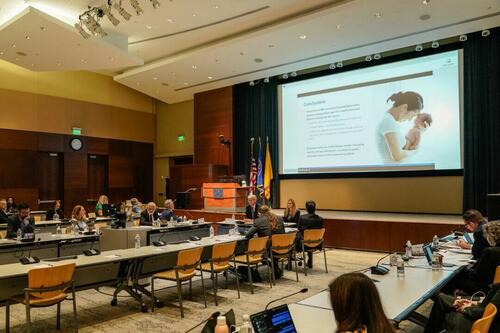
CDC Advisers Vote To Recommend Removal Of Mercury From Influenza Vaccines
Authored by Zachary Stieber via The Epoch Times (emphasis ours),
Advisers to the Centers for Disease Control and Prevention on June 26 advised the agency to stop recommending influenza vaccines containing a mercury-based preservative.
 The CDC’s Advisory Committee on Immunization Practice meets in Atlanta on June 25, 2025. Elijah Nouvelage/Getty Images
The CDC’s Advisory Committee on Immunization Practice meets in Atlanta on June 25, 2025. Elijah Nouvelage/Getty ImagesThe Advisory Committee on Immunization Practices (ACIP) in a series of votes reaffirmed the existing recommendation that virtually all individuals aged at least 6 months of age receive an annual influenza shot. The panel further advised, though, that individuals only receive thimerosal-free vaccines.
About 95 percent of influenza vaccines administered in the United States in late 2024 and early 2025 were free of thimerosal, according to the Food and Drug Administration. Dr. Tracy Hoeg, an FDA official, told the committee that there appear to be enough influenza vaccine doses without thimerosal for the upcoming virus season, which runs from the fall into the winter.
A spokesperson for Sanofi told The Epoch Times in an email: “We acknowledge the recommendation of the new ACIP. We now await the decision by the CDC on the path forward.
“We will have sufficient supply of Sanofi flu vaccine to support customer preference for this season.”
Seqirus, which also produces influenza vaccines with thimerosal, has not responded to requests for comment.
ACIP provides advice to the CDC’s director, who typically adopts the recommendations.
The CDC has no acting director listed on its website. President Donald Trump’s nominee for the post, Susan Monarez, is being considered by the Senate. The CDC and its parent agency, the Department of Health and Human Services, did not respond to requests for comment.
Health Secretary Robert F. Kennedy Jr. earlier in the year adopted some recommendations offered by ACIP.
Kennedy has long opposed vaccines with thimerosal, and the panel heard before the vote from Lyn Redwood, a past president of a nonprofit that Kennedy founded who is now listed as an employee of the Department of Health and Human Services.
Redwood said in her presentation that a number of studies have provided evidence against thimerosal, including a 2003 paper that found an association between thimerosal exposure and tics and a 2007 study that found links to several positive and several negative associations, including a lower measure of executive functioning.
“There have been studies that have found evidence of harm,” Redwood said.
Thimerosal is about 50 percent mercury by weight. It was used broadly in vaccines for decades before largely being phased out in the 2000s in what federal officials have described as a precautionary measure.
“We do have a risk of repeated exposure to this. So it’s not just a one administration, but potential chronic exposure on an annual basis,” Dr. Robert Malone, one of the CDC’s advisers, said after listening to Redwood’s presentation.
A number of CDC advisers said they supported lowering exposure to mercury, noting that mercury is a known toxin.
“We need to do whatever we can to control the controllable sources of exposure,” Retsef Levi, another panelist, said.
Dr. Cody Meissner, a pediatrician who was just reappointed to the committee, strongly opposed the move.
“ACIP makes recommendations based on scientific evidence as much as possible,” he said. “And there is no scientific evidence that thimerosal has caused a problem.”
Some representatives of health groups serving as liaisons to the committee, including Dr. Matthew Zahn with the National Association of County and City Health Officials, told the panel before the vote that they think thimerosal-containing vaccines are safe.
The CDC said in an unsigned document posted online on June 24 that “evidence does not support an association between thimerosal-containing vaccines and autism spectrum disorder or other neurodevelopmental disorders.” Staffers said that the papers that have found an increased risk of neurodevelopment disorders and autism from thimerosal-containing vaccines ”have significant methodological limitations including unmeasured confounding, inaccurate assessment of exposures, differences in control and case groups, unverified diagnoses, and other potential biases that threaten the validity and reliability of the findings.”
The document was taken offline before the meeting.
“This document by the CDC vaccine safety office did not go through the appropriate process to be posted,” a spokesperson for the Department of Health and Human Services told The Epoch Times in an email.
The spokesperson said the document was provided to all ACIP members, and members said they had reviewed it.
In the first vote, every adviser except for one voted in favor of keeping the existing recommendation that people aged 6 months and older receive an influenza vaccine on an annual basis unless they have a contraindication. The next three votes focused on whether to recommend thimerosal-free vaccines for various populations.
Vicky Pebsworth, one of the members, abstained from all four votes, saying she did not think there had been enough discussion about the topic. Meissner voted no on the thimerosal-free vaccine votes. All other advisers voted yes.
Members said in a joint statement after the meeting: “We came to this meeting with no predetermined ideas and will make judgments as if we are treating our own families. Unbiased scientific thinking is fundamental to the committee’s charge. Our votes are recommendations, but we know that some may perceive them as mandates, so we take this responsibility very seriously. We pledge to not hold a vote if there is not sufficient information to enable evaluation of the risks and benefits.”
Kennedy recently removed all 17 members of ACIP and replaced them with new members.
Kennedy wrote in a lengthy social media post on June 24 that “there are high bolus doses of mercury in flu shots” and that the cumulative impact of the doses in children who receive a shot every year could result in levels much higher than recommended. He also cited multiple papers, including a study that found higher brain-to-blood mercury concentration ratios in monkeys exposed to thimerosal versus a control group.
Tyler Durden
Fri, 06/27/2025 – 19:15














